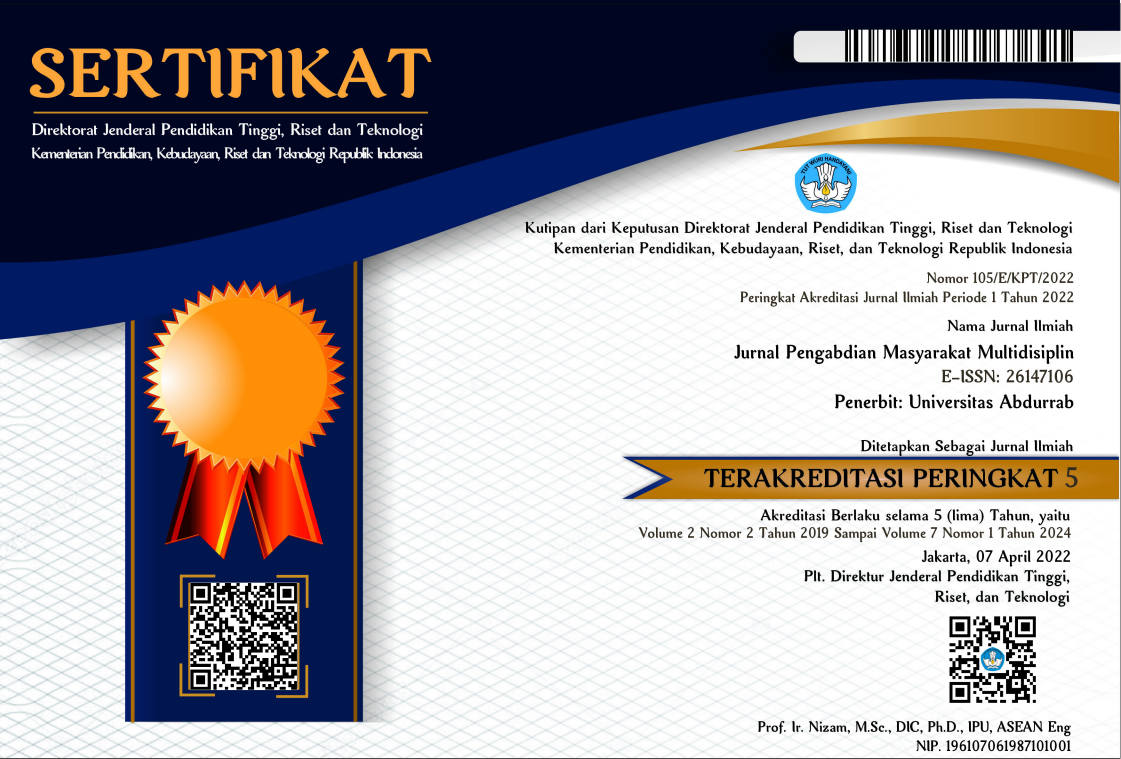INOVASI PENGOLAHAN LIMBAH RUMAH TANGGA MENJADI PUPUK UNTUK PETANI DESA PUUBENUA
DOI:
https://doi.org/10.36341/jpm.v8i1.5237Keywords:
household waste, organic fertilizer, training, waste management, sustainable agriculture.Abstract
Household waste that is not managed properly can have a negative impact on the environment, especially in rural areas such as Puubenua Village, which does not have an adequate waste management system. One of the solutions offered to overcome this problem is to convert household waste into organic fertilizer, which is not only environmentally friendly but can also increase agricultural yields. The purpose of this activity is to provide training to the community on the processing of household waste into organic fertilizer, which is expected to reduce the volume of waste and farmers' dependence on chemical fertilizers. The methods used in this program include an initial survey to determine the condition of household waste in Puubenua Village, training in making organic fertilizer, and mentoring and monitoring for two months to ensure that the implementation of the program runs well. Data were collected through interviews and direct observation to evaluate the program's impact on the environment and agricultural productivity. The results of this program show that the processing of household waste into organic fertilizer has succeeded in reducing the volume of waste by up to 70%, as well as reducing the use of chemical fertilizers by farmers by up to 50%. In addition, public awareness of the importance of independent waste management has increased significantly, and the application of organic fertilizers has a positive impact on agricultural products. In conclusion, this program has succeeded in providing an effective solution to the household waste problem while improving the economic welfare of farmers. This program is expected to be implemented in other villages to support sustainable agriculture and environmentally friendly waste management
Downloads
References
H. Husnah, R. Tisnawan, and M. F. Anugrah, “Mengelola Sampah Menjadi Pupuk Kompos Di Kelurahan Rantau Panjang Rumbai Pekanbaru,†Jurnal Pengabdian Masyarakat Multidisiplin, vol. 3, no. 3, pp. 209–215, Jun. 2020, doi: 10.36341/jpm.v3i3.1333.
hudan Irsyadi, sulmi magfira, abd Hakim Husen, and A. Nurfadillah, “Sosialisasi sadar sampah melalui pengelolaan sampah sebagai upaya peningkatan produksi pertanian berbasis budaya hidup sehat di desa sebelei, kecamatan makian barat - halmahera selatan,†Madaniya, vol. 4, no. 4, 2023.
M. Ahsan, S. Mandra, A. R. Asrib, N. Anny, and S. Taufieq, “Pelatihan Pengelolaan Sampah Organik Menjadi Pupuk Cair bagi Kelompok Ibu PKK di Kota Makassar,†Madaniya, vol. 3, no. 4, 2022, [Online]. Available: https://madaniya.pustaka.my.id/journals/contents/article/view/303
F. Arifan, W. Ari Setyati, R. Wisnu Broto, A. Larasati Dewi, U. Diponegoro Jl Soedarto, and U. Kampus Tembalang, “Pemanfaatan Nasi Basi Sebagai Mikro Organisme Lokal (MOL) Untuk Pembuatan Pupuk Cair Organik di Desa Mendongan Kecamatan Sumowono Kabupaten Semarang,†JURNAL PENGABDIAN VOKASI, vol. 01, no. 04, 2020.
Y. Jusman, A. Zaki, M. A. Nuraini, and W. Tyassari, “Pelatihan Pengolahan Limbah Pertanian Di Desa Ngeposari,†Jurnal Pengabdian Masyarakat Multidisiplin, vol. 7, no. 1, pp. 77–83, Oct. 2023, doi: 10.36341/jpm.v7i1.3861.
Nurliah, S. Elikas, and U. W. Sagena, “Sosialisasi Pengelolaan dan Pemanfaatan Sampah Organik Rumah Tangga Dalam Memproduksi Ekoenzim,†Jurnal Pengabdian Masyarakat Madani, vol. 2, no. 1, 2022.
S. H. Pujihartati, R. Delji, R. N. Sukma, and S. P. Dita Adzani, “Pemanfaatan Limbah Kotoran Sapi Menjadi Pupuk Organik Dalam Upaya Peningkatan Perekonomian Gapoktan Desa Sambirembe,†Jurnal Pengabdian Masyarakat Multidisiplin, vol. 4, no. 2, pp. 132–138, Mar. 2021, doi: 10.36341/jpm.v4i2.1694.
I. Putu Artaya, I. Gede Arimbawa, and S. Nilowardono, “Proses Pembuatan Eco Enzyme Berbahan Sampah Organik Rumah Tangga Sebagai Penunjang Desa Ramah Lingkungan,†Madaniya, vol. 5, no. 2, 2024, [Online]. Available: https://madaniya.biz.id/journals/contents/article/view/759
S. Sulastri, M. Adam, Y. Saftiana, W. Nailis, and Y. H. Putri, “Peningkatan Produktivitas dan Pendapatan Masyarakat melalui Diversifikasi Usaha Tani Pembuatan Pupuk Organik,†Jurnal Abdimas Multidisiplin, vol. 1, no. 2, pp. 89–100, Apr. 2023, doi: 10.35912/jamu.v1i2.1787.
K. G. Wong, G. J. Rubiyatno, M. A. Diva, V. Wadyatenti, and I. Y. Listyarini, “Pengembangan Produk Berkelanjutan berupa Maggot Kering dan Pupuk Organik di Kampung Wisata,†Madaniya, vol. 4, no. 4, 2023, [Online]. Available: https://madaniya.biz.id/journals/contents/article/view/616
Z. Lubis, “Pemanfaatan Mikroorganisme Lokal (MOL) Dalam Pembuatan Kompos,†Prosiding Seminar Nasional Hasil Pengabdian, 2020.
R. Ahmadi, M. Nashruddin, and H. J. Parmi, “Pemanfaatan Kotoran Sapi Dengan Dekomposer Microbacter Alfaafa-11 Sebagai Bahan Pupuk Organik,†JMM (Jurnal Masyarakat Mandiri), vol. 6, no. 6, p. 4506, Dec. 2022, doi: 10.31764/jmm.v6i6.10840.
Downloads
Published
How to Cite
Issue
Section
License
1. Copyright of all journal manuscripts is held by the Jurnal Pengabdian Masyarakat Multidisiplin.Formal legal provisions to access digital articles of electronic journal are subject to the provision of the Creative
2. Commons Attribution-ShareAlike license (CC BY-NC-SA), which means that Jurnal Pengabdian Masyarakat Multidisiplin is rightful to keep, transfer media/format, manage in the form of databases, maintain, and
3. publish articles.Published manuscripts both printed and electronic are open access for educational, research, and library purposes. Additionally, the editorial board is not responsible for any violations of copyright law.
licensed under a Creative Commons Attribution-ShareAlike 4.0 International License.







